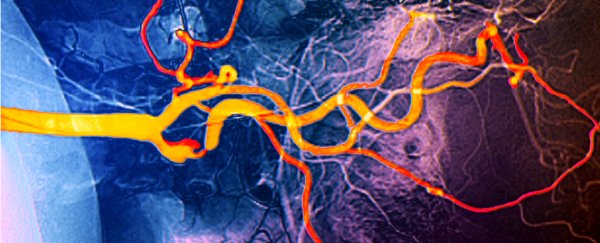Just because you're young and healthy, doesn't mean the coronavirus won't affect you.
Young adults who show only minor symptoms of COVID-19 may still suffer lingering changes to their blood vessels, according to a small new study.
While the SARS-CoV-2 primarily impacts the lungs and is particularly dangerous for older people, growing research suggests it also leaves a lasting mark on the cardiovascular system, even among young people and those who experience only mild symptoms.
In the most recent study, scientists compared the vascular health of 30 young adults, half of whom had tested positive for COVID-19 about a month before and half of whom were in good health.
Analyzing ultrasound recordings of their pumping arteries, the team found a significant difference between both groups.
Even though no one had been hospitalized, the arteries of those who contracted COVID-19 three to four weeks ago were stiffer and less elastic than the healthy group.
The carotid artery, which carries blood to the brain, was 27 percent less able to swell and 22 percent less elastic on average. The aortic artery, which carries blood away from the heart, was also affected.
It's unclear how these blood vessels looked before the participants contracted COVID-19, which is a limitation, but given that researchers couldn't have predicted the start of a global pandemic, they substituted those comparisons with data from healthy individuals.
The sample size is small, but the initial findings reinforce the idea that COVID-19 is not something to be trifled with. Even if you're young and healthy, and even if you barely got sick from the virus, the impact to your cardiovascular health could last long after your symptoms fade.
Changes in the stiffness and structure of arteries increase the risk of cardiovascular conditions, such as myocardial injury, arrhythmias, acute coronary syndrome, or blood clots, and this is particularly concerning for young people who also have other underlying health issues that put their vascular system at risk, like diabetes or hypertension.
Further research is needed so we can figure out who is most at risk and how long this arterial stiffness sticks around for, but the findings largely match other long-term studies which report vascular changes that can last for up to three months and are not associated with the severity of COVID-19 symptoms.
In fact, many people currently suffering from long-lasting symptoms of COVID-19 - known as long haulers - reported only mild cases initially.
Nevertheless, weeks or even months after testing positive, many say their bodies are still struggling to breathe or regulate their blood pressure, suggesting long-term damage to the heart and lungs.
Young and old, symptoms or no, this is a virus we should all do our best to avoid contracting and spreading.
The study was published in Experimental Physiology.
